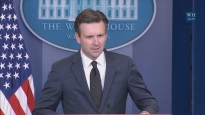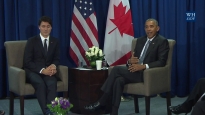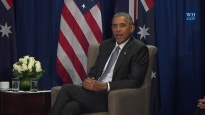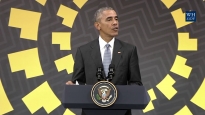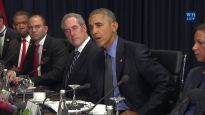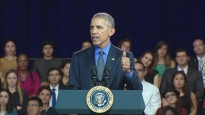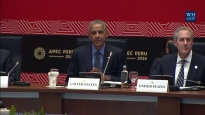President Obama Addresses Business Roundtable
February 24, 2010 | 38:56 | Public Domain
The President speaks to the Quarterly Meeting of the Business Roundtable in Washington DC about the economy and creating new jobs.
Remarks by the President to the Business Roundtable
1:00 P.M. EST
THE PRESIDENT: Thank you. Thank you, Ivan, for the terrific introduction, which was short and that's how I like it. (Laughter.) I want to thank John for the great work that he’s been doing with our team. And thank you all. Welcome to Washington. It is wonderful to be back here with the men and women of the Business Roundtable.
Over the last year, we’ve worked together on a number of issues –- from economic recovery and tax policy to education and to health care. And more often than not, we’ve found common ground. This is important, because we meet at a time, as all of you are aware, a time of great economic anxiety and sharp political divisions. We’re still emerging from the worst economic crisis since the Great Depression. Eight million Americans have lost their jobs over the last two years. Home values in too many parts of the country have plummeted. And too many businesses are still reluctant to invest and expand.
And what’s more, this recession follows what some have called the “lost decade” -– a decade in which the average family income fell while the costs of health care and tuition skyrocketed; a decade in which a continued erosion of America’s manufacturing base hollowed out many communities around the country and put too many good jobs out of reach.
It’s no wonder, then, that people are frustrated. They’re frustrated with government and they’re frustrated with business. They’re angry at a financial sector that took exorbitant risks by some in pursuit of short-term profits, and they’re angry at a government that failed to catch the problem on time. They’re angry at the price they paid to prevent a financial meltdown that they didn’t cause, and they’re angry that recovery in their own lives seems to be lagging the recovery of bank profitability. They’re angry at the lobbyists who use their influence to put their clients’ special interests ahead of the public interest. And although both parties are predictably scrambling to align themselves with people’s frustrations, neither the usual answers from the left or the right seem to be inspiring much confidence.
So we’ve got some big challenges ahead. And I think all of us know that we can’t meet them by returning to the pre-crisis status quo -– an economy that was too dependent on a housing bubble, on consumer debt, on financial speculation, and on growing deficits. That’s not sustainable for American workers, and it’s not sustainable for American businesses.
Instead, we need an economy where we borrow less and produce more. We need an economy where we generate more jobs here at home and send more products overseas. We need to invest and nurture the industries of the future, and we need to train our workers to compete for those jobs.
And nations around the world, from Asia to Europe, have already realized this. They’re putting more emphasis on math and science. They’re building high-speed railroads and expanding broadband access. They’re making serious investments in clean energy because they want those jobs. These countries know what’s required to compete in the 21st century. And so do we. As I said in the State of the Union, I do not accept second place for the United States of America.
We did not achieve global leadership in the last century by luck or by happenstance. We earned it by working together to define our own destiny and seize the future. And to maintain our leadership in this new century, we must summon that same resolve.
A thriving, competitive America is within our reach -- but only if we move forward as one nation; only if we move past the old debates and the crippling divides between left and right, between business and labor, between private enterprise and the public sector. Whatever differences we have in this country, all of us have a stake in meeting the same goal, which is an America in which a growing prosperity is shared widely by its people.
So today I want to spend most of my time talking about the specific steps we need to take to build this more competitive America. But before I do, I want to talk a little bit about the relationship between business and government in promoting economic growth.
Now, contrary to the claims of some of my critics and some of the editorial pages, I am an ardent believer in the free market. I believe businesses like yours are the engines of economic growth in this country. You create jobs. You develop new products and cutting-edge technologies. And you create the supply chains that make it possible for small businesses to open their doors. So I want everyone in this room to succeed. I want your shareholders to do well, I want your workers to do well, I want you to do well -- because I firmly believe that America’s success in large part depends on your success internationally.
Now, I also believe this: Government has a vital, if limited, role to play in fostering sustained economic growth and creating the foundations for you to succeed. Throughout our history, government has done so in three ways.
First, government has set up basic rules of the marketplace –- from the enforcement of contracts and managing the money supply, to maintaining airline safety standards and creating federal deposit insurance. And on balance, these rules have been good for business, not bad, for they ensure honest competition and fair dealing and a level playing field.
Second, only government can make those investments in common goods that serve the general welfare but are too expensive for any individual or firm to purchase on their own. Our Armed Forces is the most obvious example. But government has also built infrastructure – from roads and ports to railways and highways that enabled commerce and spurred entire industries. Government has invested in basic research that led to new crop yields for farmers and the Internet. Government has invested in our people, through land grant colleges and the GI Bill.
And finally, government has also provided a social safety net to guarantee a basic level of security for all our citizens. Now, this last role has been obviously a source of great controversy over the last several decades. But I think most Americans and most business leaders would agree that programs like Social Security and Medicare and Medicaid and unemployment insurance haven't just saved millions from poverty, they've helped secure broad-based consensus that is so critical to a functioning market economy.
Now, the Business Roundtable has always understood that in each of these instances, government hasn't stepped in to supplant private enterprise, but to catalyze it, to create the conditions for entrepreneurs and new businesses to adapt and to thrive.
But I take the time to make these points because we've arrived at a juncture in our politics where reasonable efforts to update our regulations, or make basic investments in our future, are too often greeted with cries of "government takeover" or even "socialism."
Not only does that kind of rhetoric deny our history, but it prevents us from asking hard questions about the right balance between the private and public sectors. Let me give you some examples. Too little investment in a competitive infrastructure or an education system that works for our children and we risk falling behind countries that are making these investments right now. On the other hand, if we just throw money at poorly planned projects or failing schools, then we'll remain in debt to those same countries for decades to come.
If we don't pass financial reform, we can expect more crises in the future of the sort that we just saw. On the other hand, if we design the new rules carelessly, they could choke off the supply of capital to businesses and families. If we allow our safety net to be weakened, or lose a sense of fairness in our tax code, then we can expect more anger and frustration from citizens across the political spectrum. And at the same time, if an exploding entitlement state is gobbling up more and more of our tax dollars, there's no way we'll retain our competitive edge.
So rather than hurling accusations about big-government liberals or mean-spirited conservatives, we're going to have to answer those tough questions. And getting that balance right has less to do with big government or small government than it has to do with smart government. It's not about being anti-business or pro-government; it's about being pro-growth and pro-jobs. And while there are no simple formulas or bumper-stickers that can encapsulate all the work that has to be done here, I do want to discuss a few specific areas where we have to get things right.
Now, our first and most immediate task is to complete the economic recovery by taking additional steps to bolster demand and keep credit flowing. Along with our efforts to unfreeze credit and stabilize the housing market, the Recovery Act helped to do this, and it's one of the main reasons our economy has gone from shrinking by 6 percent to growing by nearly 6 percent.
But we need to do more. We should make it easier for small businesses to get loans, and give them a tax credit for hiring new workers or raising wages. We should invest in infrastructure projects that lead to new jobs in the construction industry and other hard-hit businesses. And we should provide a tax incentive for large businesses like yours to invest in new plants and equipment. That would make a difference now.
And we need businesses to support these efforts. The Business Roundtable supported the Recovery Act, and for that I’m grateful. But I think one of the reasons businesses haven’t been as vocal about their support is a belief that extraordinary measures like the Recovery Act or our financial stability plan somehow represent a lasting increase in government intervention. So let me assure you, let me be clear, they do not.
One year ago, we were looking at the possible end of General Motors. Today, GM has increased production, is paying us back ahead of schedule. Yesterday, we learned they're hiring 1,200 more workers in their Lordstown, Ohio plant. One year ago, there was a chance we would lose most of the $700 billion we were given to rescue the financial system. Today, most of that money has been repaid. The financial fee we’ve proposed would recover the rest and close the books on government’s involvement.
And let me say a word about compensation here. Most Americans -- including myself -- do not begrudge reasonable rewards for a job well done. What's outraged people are outsized bonuses at firms that so recently required massive public assistance. Once that money is fully repaid, I don’t believe it’s appropriate for the government to be in the business of setting compensation levels. I do believe that shareholders should have a say in compensation packages given to top executives, and that those packages should be based on long-term performance instead of short-term profits. And I think that's particularly important in the financial industry, where reckless risks in pursuit of short-term gain helped create a crisis that engulfed the world economy.
But here's the larger point that I'm trying to make. The steps we took last year were about saving the economy from collapse, not about expanding government's reach into the economy. The jobs bill working through Congress right now are similarly designed to be targeted and temporary. And I'm pleased that a few hours ago the Senate just passed a series of tax cuts for small businesses that hire more workers. This is an important step forward in putting more Americans back to work as soon as possible.
Now, the larger question is this: Beyond the immediate requirements of recovery, how do we lay the foundation for a more competitive America? How do we help you succeed? Now, I believe it starts with investments in innovation, in education, and a 21st century infrastructure. To build the infrastructure of tomorrow, we're investing in expanded broadband access and health information technology, clean energy facilities and the first high-speed rail network in America.
To spur the discovery of services and products and industries we have yet to imagine, we're devoting more than 3 percent of our GDP to research and development -– an amount that exceeds the level achieved at the height of the space race. We've also proposed making the research and experimentation tax credit permanent –- a tax credit that helps companies like yours afford the high costs of developing new technologies and new products.
To train our workers for the jobs of tomorrow, we've made education reform a top priority in this administration. We are not interested in just putting more money into our schools; we want that money moving toward reform. And last year we launched a national competition to improve our schools based on a simple idea: Instead of funding the status quo, we will only invest in reform –- reform that raises student achievement and inspires students to excel in math and science, and turns around failing schools that steal the future of too many young Americans.
I just met this week with the nation’s governors, and education reform is one of those rare issues where both Democrats and Republicans are enthusiastic.
And to achieve my goal of ensuring America again has the highest proportion of college graduates in the world by 2020, I’m urging the Senate to pass a bill that will make college more affordable by ending the unnecessary taxpayer subsidies that go to financial intermediaries for student loans. It’s a bill that will also revitalize our community colleges, which this organization has recognized are a career pathway to the children of so many working families.
And just as government needs to support young people eager to learn, I’m very pleased to see that the business community has already begun to bet on the next generation of American talent. Just yesterday, 17 high-tech companies announced plans to hire over 10,000 college graduates this year. That's good news. That's the kind of partnership that we need.
Finally, we’re investing in innovation that will lead to a more efficient, affordable and consumer-friendly federal government. Almost all of you have harnessed new technologies to build thriving businesses and provide better services to your customers. There’s no reason government shouldn’t do the same, and give taxpayers a better bang for their buck.
With new technology, we're creating a single electronic medical record for our men and women in uniform that will follow them from the day they enlist until the day that they are laid to rest. We're cutting down the time it takes to get a patent approved by cutting out unnecessary paperwork and modernizing the process. And my Secretary of Commerce, Gary Locke, is here today, and is doing an outstanding job leading that effort. We're working to give people the chance to go online and book an appointment at the Social Security office or check the status of their citizenship application –- services countless businesses already provide. Government should be doing the same.
So in all of these areas -– in infrastructure, in research, in education, and in government reform -– we're making investments that will lead to new products and services that will help America compete on the world stage. It means increases in productivity and increases in efficiency, and that's where we're going to need to be competitive.
Now, winning that competition also means we need to export more of our goods and services to other nations -– something that supports more jobs here in the United States of America. Unfortunately, the federal government has not done a great job advocating for companies' exports abroad.
That's why, in the State of the Union, I set a goal of doubling our exports over the next five years, an increase that will support 2 million jobs. And to help me meet this goal, Gary Locke recently announced that we're launching a National Export Initiative where the federal government will significantly ramp up its advocacy on behalf of U.S. exporters. We're substantially expanding the trade financing available to exporters, including small and medium-sized companies. And while always keeping our security needs in mind, we're going to reform our export controls to eliminate unnecessary barriers. So some of the sectors where we have a huge competitive advantage in high-tech areas, we're going to be able to send more of those products to markets overseas. And we're going to pursue a more strategic and aggressive effort to open up new markets for our goods.
Now, I know that trade policy has been one of those longstanding divides between business and labor, between Democrats and Republicans. To those who would reflexively support every and any trade deal, I would say that our competitors have to play fair and our agreements have to be enforced. We can't simply cede more jobs or markets to unfair trade practices. At the same time, to those who would reflexively oppose every trade agreement, they need to know that if America sits on the sidelines while other nations sign trade deals, we will lose the chance to create jobs on our shores. In other countries, whether China or Germany or Brazil, they've been able to align the interests of business, workers, and government around trade agreements that open up new markets for them and create new jobs for them. We must do the same. And I'm committed to making that happen.
That's why we launched the Trans-Pacific Partnership to strengthen our trade relations with Asia, the fastest-growing market in the world. That's why we will work to resolve outstanding issues so that we can move forward on trade agreements with key partners like South Korea and Panama and Colombia. And that's why we will try to conclude a Doha trade agreement –- not just any agreement, but one that creates real access to key global markets.
A competitive America is also America that finally has a smart energy policy. We know there's no silver bullet here. We understand that to reduce our dependence on oil and the damage caused by climate change, we're going to need more production in the short term, we're going to need more efficiency, and we need more incentives for clean energy.
And already, the Recovery Act has allowed us to jumpstart the clean energy industry in America -– an investment that will lead to 720,000 clean energy jobs by the year 2012. To take just one example, the United States used to make less than 2 percent of the world's advanced batteries for hybrid cars. By 2015, we’ll have enough capacity to make up to 40 percent of these batteries.
We’ve also launched an unprecedented effort to make our homes and businesses more energy efficient. We’ve announced loan guarantees to break ground on America’s first new nuclear plant in nearly three decades. We’re supporting three of the largest solar plants in the world. And I’ve said that we’re willing to make tough decisions about opening up new offshore areas for oil and gas development. So what we're looking at is a comprehensive strategy, not an either/or strategy but a both/and strategy when it comes to energy.
But to truly transition to a clean energy economy, I’ve also said that we need to put a price on carbon pollution. Many businesses have embraced this approach -- including some who are represented here today. Still, I am sympathetic to those companies that face significant potential transition costs, and I want to work with this organization and others like this to help with those costs and to get our policies right.
What we can’t do is stand still. The only certainty of the status quo is that the price and supply of oil will become increasingly volatile; that the use of fossil fuels will wreak havoc on weather patterns and air quality. But if we decide now that we’re putting a price on this pollution in a few years, it will give businesses the certainty of knowing they have the time to plan for the transition. This country has to move towards a clean energy economy. That’s where the world is going. And that’s how America will remain competitive and strong in the 21st century.
We will also be more competitive if we address those costs and risks that are preventing our economy from reaching its full potential. I'll list three critical areas: outdated financial regulations, crushing health care costs, and a growing deficit.
Right now we have a financial system with the same vulnerabilities that it had before this crisis began. And as I said in the State of the Union, my goal is not to punish Wall Street. I believe that most individuals in the financial sector are looking to make money in an honest and transparent way. But if there aren't rules in place to guard against the recklessness of a few, and they're allowed to exploit consumers and take on excessive risk, it starts a race to the bottom that results in all of us losing.
And that's what we need to change. We can't repeat the mistakes of the past. We can't allow another AIG or another Lehman to happen again. We can't allow financial institutions, including those that take your deposits, to make gambles that threaten the whole economy. What does that mean? It means we've got to ensure consolidated supervision of all institutions that could pose a risk to the system. It means we have to close loopholes that allow financial firms to evade oversight and circumvent rules of the road. It means that we need more robust consumer and investor protections.
And I ask the Business Roundtable to support these efforts. There are lobbyists on the Hill right now trying to kill reform by claiming that it would undermine businesses outside of the financial sector. That is not true. This is about putting in place rules that encourage drive and innovation instead of shortcuts and abuse. And those are rules that will benefit everybody.
Now, another undeniable drag on our economy is the cost of health care. And I appreciate the willingness of the Business Roundtable to work with us on health care reform. When you’ve had concerns about specific measures or policies, we’ve listened and in many cases we've made changes. But I know that there are many who have been skeptical of our reform efforts -- because in the wake of extraordinary measures that we took to rescue our economy, it’s been an easy political tactic to characterize any effort at health reform as a “big government takeover.”
But let's look at the truth, because the truth is just the opposite. We have not called for the elimination of private insurance. We have not -- we've been extraordinarily careful not to in any way undermine the employer-based system. What we’ve called for is an insurance exchange where individuals and small businesses can pool together in order to get a better deal from their insurance companies. In return for getting more customers, we would require insurance companies not to discriminate on the basis of preexisting conditions or arbitrarily jack up premiums.
We’ve also incorporated almost every serious idea from across the political spectrum about how to contain the rising costs of health care. As a result, our proposal would reduce the deficit by as much as a trillion dollars over the next decades, and would directly affect your bottom lines -- each and every one of you who are already providing insurance to your employees -- by a significant amount.
All these steps would provide more certainty for your businesses, not less. Because there's no certainty in a future where premiums rise without limit; there's certainly no certainty where companies are forced to drop coverage or cut back elsewhere. That can’t be good for business. Our proposal contains good ideas from Democrats and Republicans and health care experts across the spectrum.
And tomorrow, I look forward to a good exchange of ideas at the Blair House with some of the legislative leaders. And I hope everyone comes with a shared desire to solve this challenge, not just score political points. And I hope the roundtable supports our efforts to finally pass reform that works for the American people and for American businesses.
Now, one of benefits of health care reform is that by bringing down the cost of Medicare and Medicaid, it would significantly reduce our deficit. And I know this is an issue of great concern to many of you. My OMB Director, Peter Orszag, will be here soon to give you the scary numbers. I promise you this is on my mind each and every day.
I walked into office facing a massive deficit, most of which was the result of not paying for two wars, two tax cuts, and an expensive prescription drug program. Keep in mind the budget was balanced; in fact, we were running a surplus in 2000. When we walked in, we had a deficit of $1.3 trillion and projected debt over the course of a decade of $8 trillion. The lost revenue from this recession put us in an even deeper hole. And the steps we took to save the economy from depression last year have necessarily added to the deficit -- about $1 trillion, compared to the $8 trillion that we inherited.
Now, I've said we intend to pay for what we added. So my administration is doing what families and businesses all across the country are doing during these difficult times -- we’re tightening our belts and making tough decisions. We’re investing only in what we need and sacrificing what we can do without. We’ve gone line by line through the federal budget and identified more than 120 programs for elimination -- a total of $20 billion in savings just for next year. Starting in 2011, I’ve proposed a freeze on non-security discretionary government spending for three years -- something that was never enacted in the last administration.
I’m also grateful that Congress responded to my request and restored a simple budgeting rule that every family and business understands, called pay as you go. And I’ve established a bipartisan fiscal commission that will provide a specific set of solutions by the fall to deal with our medium- and long-term deficit.
Of course, as many of you have reminded us, budget cuts aren’t the only step we’ve proposed this year to help bring down the deficit, which brings me to everybody’s favorite topic -- taxes. You'll notice I've saved the best for last. Now, I want to set the record straight on this issue, because it's been one of the largest sources of tension between our administration and the business community.
During the campaign, I promised a tax cut for 95 percent of working Americans. I kept that promise. We've provided over $150 billion in tax cuts to small businesses and to families. We haven't raised anybody's income taxes by a single dime. This year, I expect to sign into law another $70 billion worth of business tax cuts for 2010 and 2011 -– a more than 10 percent cut in corporate taxes. Now, that may not jibe with what you're hearing or what you're reading, but those are the facts. They're indisputable.
Now, I've also made two other promises during the campaign. I promised that folks making over $250,000 a year -- meaning everybody in this room plus me -- would go back to paying the marginal tax rates they did in the 1990s -– a time when businesses did pretty well; a lot of millionaires were made. I'm not doing this to be punitive or because I love paying taxes. I'm doing it because at a time of two wars and massive deficits, I can't justify continuing to give millionaires or billionaires big tax cuts.
The other promise I made during the campaign was to ensure that our tax code doesn't provide relief and a competitive advantage to companies that move jobs and investment outside of the United States relative to companies that are investing here in the United States.
Now, a number of you have made the point that we shouldn’t discourage anyone from keeping headquarters and operations in America and that we have to balance your needs to compete overseas. I'm sympathetic to that. And after listening to you, we’ve made some modifications to our proposal. But as President of the United States, my interest is to reward –- or at least not disadvantage –- companies who are creating more jobs and doing more business within the borders of this country. That’s not anti-business; it’s pro-America. And I don’t apologize for it.
On all these issues -– from education to health care to taxes -– my first question can’t be, “Is this good for business?” or “Is this good for labor?” It can’t be, “Is this good politics?” “Are folks going to tag me as a liberal or a conservative?” The only question I have to ask myself is, “Is this good for America? Does it help us compete? Does it grow our economy? Does it create jobs for middle-class and those trying to join the middle class? Is it fostering innovation and creating new business opportunities?” That’s my job as President.
Having said that, I also know that government can’t meet all of these challenges on its own. Ultimately, the success of this economy is going to depend on you and people like you all across the country. And it's going to depend on our workforce and our families.
You know, when it comes to education, we need parents who are willing to read to their children and help with their homework -- regardless of how much government is going to reform the school system -- if we're going to compete. When it comes to energy, we need consumers who are willing to buy more efficient appliances and automobiles, and conserve where they can. And when it comes to an economy that works for every American, we need business leaders like you who understand that private enterprise also entails some public responsibility.
Andy Grove, who most of you know was the CEO of Intel, once gave an interview where he said, “Those of us in business have two obligations in my opinion. The one that’s undebatable is that we have a fiduciary responsibility to…the shareholders who put us in our place. There’s another obligation that I feel personally,” is what Mr. Grove said, "given that everything I've achieved in my career and a lot of what Intel has achieved in its career were made possible by a climate of democracy, an economic climate and investment climate provided by our domicile, the United States."
Now, it's undoubtedly in the short-term interests of individual corporations at any given moment to pay less in taxes, to deal with fewer regulations -- I understand that. But it's in the long-term interest of all companies to do business in a nation that maintains the world's best research facilities and universities; a nation with public schools that graduate highly skilled, highly educated young people; a nation with functioning railways and airports; a nation that's not dragged down by crushing debt; a nation in which families are getting good jobs, and when they work hard they can support those families.
If you pay your workers a salary they can raise a family on, they're going to feel more loyalty to your company. And if we have rules of the road that guard against recklessness in our financial system, it will protect the interests of everyone from the wealthiest CEOs to the lowest-paid workers. If we give that kid in the Bronx a world-class education, it doesn't just benefit that child; it benefits the company that might hire him down the road and it benefits the country that child lives in. To put it simply, we are all in this together.
I am a big booster of each and every one of you. And I will go to bat for you every time as you compete in a tough international environment. But we're going to have to do this together. And we face some very big challenges right now. The only way we're going to get through them -- and the only way we ever have -- is if we align the interests of workers and businesses and government around a common purpose; if we all pick up an oar and start rowing in the same direction.
At a time of such economic anxiety, it's tempting, and maybe it's easier, to turn against one another and to find scapegoats to blame. So politicians can rail against Wall Street or against each other, and businesses can fault Capitol Hill, and all of it makes for easy talking points and good political theater. But it doesn't solve our problems. It doesn't move us forward. It just traps us in the same debates and divides that have held us back for a very long time and forced us to keep on punting down the road the same problems we've been facing for decades.
And I believe we can't afford that kind of politics anymore. Not now. But we know the way forward, and we know what the future can be. And I am confident we can get there. And I'm confident because we have the hardest-working, most productive citizens in the world. I'm confident because our universities and research facilities are second to none. And I'm confident because of the caliber of the leaders and businesses represented in this room.
We're not going to agree on every single issue, we're not going to support the same policies every time, but I promise I will never stop listening to your concerns and your ideas, and I will never stop rooting for your success -- because we are in this together. And whether we rise or fall as a nation doesn't depend on some economic forces that are beyond our control. It depends on us -- on the ingenuity of our entrepreneurs, the determination of our workers, and the strength of our people.
I've always believed in that strength and I remain extraordinarily hopeful about our future. So thank you very much, everybody. (Applause.)
END
1:39 P.M. EST
|
November 22, 2016
|
November 22, 2016
|
November 20, 2016
|
November 20, 2016
|
|
November 20, 2016
|
November 19, 2016
|
November 19, 2016
|
November 19, 2016
|
- &lsaquo previous
- …
- 6
- 7
- 8
- 9
- 10
- 11
- 12
- 13
- 14
- …
- next &rsaquo

